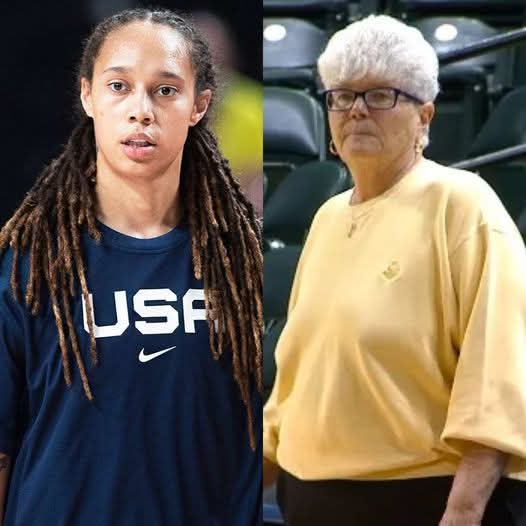Lin Dunn Speaks Out on Brittney Griner’s Place on the U.S. Olympic Team
Lin Dunn Calls for Brittney Griner to Be Expelled from U.S. Olympic Team – “You Disrespect the American Anthem, You Don’t Deserve to Represent This Country”
Lin Dunn, the well-known director of the Indiana Fever, has issued a statement that is both contentious and impassioned, in which he calls for Brittney Griner to be removed from the United States Olympic squad.

The comments made by Dunn have sparked a heated discussion among members of the sports world, with the focus being on Griner’s recent conduct and the wider consequences for athletes who represent their countries on the international scene.
Throughout her career, Lin Dunn, a well-known figure in the world of women’s basketball, has been a major advocate for sportsmanship and national pride.
Her recent statements are a reaction to a scenario that has caused differences of opinion among the general population. Brittney Griner, a renowned basketball player who has been an essential member of the United States national team and a significant figure in the Women’s National Basketball Association (WNBA), is the subject of Dunn’s criticism.
It would appear that Griner’s recent demonstration during the playing of the American national anthem served as the impetus for Dunn’s call to action. This is an act that Dunn and a great number of other people consider to be a display of disrespect.

“When you disrespect the American anthem, you don’t deserve to represent this country,” Dunn said in her statement, expressing her disgust with the situation.
The viewpoint that Dunn takes highlights the belief that national symbols, such as the national anthem, carry a significant importance that athletes ought to respect when they are in a position to represent their nation.
This emotion has its origins in a broader context, where it is frequently expected of sports figures to exemplify national values and pride, particularly on international stages such as the Olympics.
Brittney Griner, who has garnered attention not just for her remarkable athletic abilities but also for her outspoken advocacy on social problems, has been subjected to criticism from a variety of different areas. Her demonstration happened during the playing of the national anthem, and it was a part of a bigger movement in which athletes have utilized their positions to bring attention to structural inequities and fight for social change.

Although this particular style of protest has been defended by a large number of individuals as a valid exercise of their right to free expression, it has also been subjected to criticism from individuals who are of the opinion that activities of this nature weaken the unity and honor that are associated with national representation.
Important problems regarding the appropriate balance between personal expression and national duty are brought up by Dunn’s demand that Griner be removed from his position. On the one hand, Dunn’s viewpoint represents a belief in the sanctity of national symbols and the responsibility of athletes to sustain a feeling of national pride.
On the other hand, Dunn’s perspective reflects those beliefs. Griner’s actions, on the other hand, are representative of a larger discussion regarding the role that athletes should play in addressing social concerns and the degree to which their personal convictions should impact the roles that they play in their professional lives.
A bigger conversation about patriotism, dissent, and the expectations that are placed on public individuals is being tapped into by the debate that is taking place around Griner’s position on the United States Olympic team. In recent years, the connection of sports and activism has been increasingly prominent.

Athletes such as Colin Kaepernick and Megan Rapinoe have also come under attention for the forms of protest that they have engaged in.
The tension that exists between individual rights and social expectations is frequently brought to light by situations like these, particularly in situations when national symbols and values are involved.
In the course of this discussion, it is of the utmost importance to take into account the various points of view that are contributing to the conversation.
Athletes such as Brittney Griner have utilized their exposure to challenge the conventions of society and raise attention to problems that are of critical importance.
This has resulted in major discourse and, at times, controversy. In contrast, individuals such as Lin Dunn are examples of people who advocate for a perspective that places an emphasis on the significance of unity and respect for national symbols.
This is something that many people believe is essential for the preservation of a sense of national identity and pride.

When it comes down to it, the question of whether or not Brittney Griner should continue to be a member of the United States Olympic team is not just about the conduct of a single athlete; rather, it is about how society navigates the intricate relationship between individual expression and national representation.
It will be essential to engage with the nuanced views that are being presented by all parties involved as the discussion progresses, and to take into consideration the broader ramifications for sports and national identity.
An important discussion regarding respect, protest, and the role that athletes play in representing their country has been generated as a result of Lin Dunn’s demand that Brittney Griner be removed from the United States Olympic squad.

The argument hits on fundamental questions of patriotism and personal belief, highlighting the changing landscape of sports and activism in contemporary society. Although perspectives on this matter differ significantly, it is evident that the debate touches on these fundamental problems.
